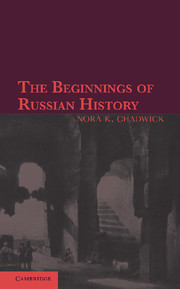Book contents
- Frontmatter
- Dedication
- Epigraph
- Contents
- Preface
- Chapter I The Early Records
- Chapter II The Early History of Kiev
- Chapter III Greek and Oriental Evidence
- Chapter IV Vladimir I
- Chapter V The Treaties with the Greeks, and Russian Heathenism
- Chapter VI Yaroslav the Wise
- Chapter VII Voevoda and Kormilets
- Chapter VIII Vladimir Monomakh
- Appendix I Extract from Ibn Miskawaih, in The Eclipse of the 'Abbasid Caliphate, Vol. v. Translated from the Arabic by D. S. Margoliouth
- Appendix II The Scandinavian Background: Oddr Víth-förli (Örvar-Oddr)
- Index
Chapter VII - Voevoda and Kormilets
Published online by Cambridge University Press: 05 June 2016
- Frontmatter
- Dedication
- Epigraph
- Contents
- Preface
- Chapter I The Early Records
- Chapter II The Early History of Kiev
- Chapter III Greek and Oriental Evidence
- Chapter IV Vladimir I
- Chapter V The Treaties with the Greeks, and Russian Heathenism
- Chapter VI Yaroslav the Wise
- Chapter VII Voevoda and Kormilets
- Chapter VIII Vladimir Monomakh
- Appendix I Extract from Ibn Miskawaih, in The Eclipse of the 'Abbasid Caliphate, Vol. v. Translated from the Arabic by D. S. Margoliouth
- Appendix II The Scandinavian Background: Oddr Víth-förli (Örvar-Oddr)
- Index
Summary
There are numerous signs throughout the reigns of Yaroslav and his successors that the national consciousness of the native populations was by no means overwhelmed by the Scandinavian princes. We have seen the populations of both Novgorod and Kiev forming themselves into powerful bodies which were in a position to take matters into their own hands when they chose, and to dictate their own terms to their princes, even to coerce the princes to their own will. This popular consciousness is seen also in the heathen reactions which take place from time to time, and show themselves in sudden and apparently unaccountable manifestations of Finnish shamanism. Indeed it is in the entries in the Povêst which recount these reactions, or rather in the measures taken by the Christian princes to stamp them out, that we can glean some idea of heathen Russia which, however slight, is yet a more genuine tradition than that of Vladimir's idols.
These indications of religious reaction are generally associated with popular discontent consequent upon times of famine. Thus in 6532 (1024) we are told that magicians (volsvi) came to Suzdal, killing old people by naushchenie (‘teaching’ or ‘instigation’) and bêsovanie (‘devilry’), declaring that ‘the harvest is being held back’ but Yaroslav seized some and dispersed the rest. The chronicler adds that he then returned to Novgorod and sent overseas for Varangians, for he was at the height of his struggle against Mstislav, and the fact that he should pay attention to the Suzdal shamans in such a crisis shows the importance which he attached to their influence, and their close association with the political situation. Nearly fifty years later, in 6579 (1071), we learn that during the inroads of the Polovtsy, which, as we know from other sources, precluded agriculture around Kiev, which supplied the citizens with food, a ‘magician inspired by the devil’ (yolkhv prêlshchen bêsom) appeared in Kiev, prophesying by concrete imagery what appear to be certain political and international changes.
- Type
- Chapter
- Information
- The Beginnings of Russian HistoryAn Enquiry into Sources, pp. 112 - 119Publisher: Cambridge University PressPrint publication year: 2013



